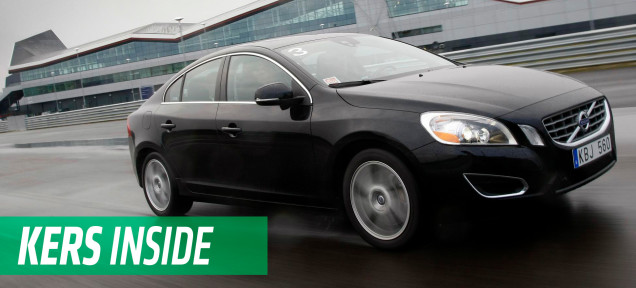Formula 1's Hybrid Kinectic Recovery System Is Coming To Your Next Car
Mar 31, 2014 18:47

The Volvo S60 above features the same technology that helped make Formula One cars so fast in the last few years. They are hiding a hybrid Kinetic Energy Recovery System in it.
These systems have become prominent in high end hypercars like the McLaren P1, Porsche 918 Spyder and LaFerrari. Now they're going on to the cars we can afford to buy.
Volvo announced recently that they have been conducting real-world tests in the UK on a flywheel-based hybrid technology that provides an 80 horsepower boost over a standard car and increases fuel economy by 25 percent.
KERS works by storing kinetic energy lost during braking and transfers it back to the wheels when an extra boost of speed is needed. It is used in F1 since 2009, and has been adopted to other racing series like 24 hours of LeMans.
The prototype S60 being tested by engineering company Flybrid Automotive, Volvo and the Swedish government works much the same way. The car's front wheels are powered by a standard 254 horsepower turbo inline five, while the KERS is fitted to the rear wheels.
Energy is transferred from the wheels to the KERS and is used to spin a 13 pound carbon fiber flywheel up to 60,000 RPM. It can be stored or used immediately.
Top Gear tested the prototype and found it to be markedly quicker than your garden-variety T5 Volvo S60:
This transforms it into a very un-Volvo-ey Volvo. Hit the KERS button and it puts on speed with a head butt, like a turbo-era hot hatch that's found some boost. When we tried it on a very moist Silverstone, the rear tyres writhed and scratched a bit before both axles settled into a cohesive thrust, then it lunged forward in a great gust of torque, which lasts, we're told, for up to ten seconds (we were on the baby Stowe circuit so couldn't let it run its course). Less empirically, with KERS switched on, our 0-60mph time dropped from 7.68 seconds to 6.07 seconds.
And all this thrust comes from a little box of gears and clutches that weighs 60kg, requires virtually no maintenance, and will last for what the company claim is the realistic life of the car. The batteries in Volvo's current petrol/electric hybrid weigh 300kg alone, and will have to be replaced after about a decade.
And all this thrust comes from a little box of gears and clutches that weighs 60kg, requires virtually no maintenance, and will last for what the company claim is the realistic life of the car. The batteries in Volvo's current petrol/electric hybrid weigh 300kg alone, and will have to be replaced after about a decade.







































































